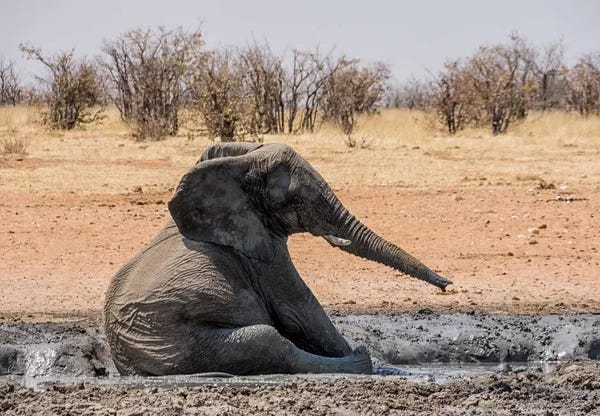An Elephant in the Mud
Reflection on How to Get Out of the Slumpy Time during the Placeholder
Lately I haven’t felt motivated in everything - especially in my work. This happens in cycles, so instead of trying to fight against this sluggish phase, I just let myself be, doing the bare minimum of work. As a busy work trip to Korea scheduled for August was coming up, I assumed I’d feel motivated again after engaging with my clients for various work projects during the trip.
Well, it didn’t work out as I expected.
Now it felt like a big problem. I had so many work projects I wanted to do well. However, instead of marching toward those works, I was not taking actions, like an elephant sitting in the mud. This elephant had no desire whatsoever to get out of this mud. Rather, it wanted to stay in the mud, feeling too comfortable to stand up for now. Soon, my inner saboteur launched a tirade, “You lazy ass elephant! What the hell are you doing?!” like a very loud parrot yapping at the elephant in the mud.
Why the inaction and low motivation? I reflected on this by going through my “Done” list. (Instead of keeping the “to-do” list and checking it off, I keep a “Done” list for all the things I did, following the advice of Oliver Burkeman). Turns out my first half of this year has been very full. My first book The Placeholder was published and I spent a lot of time launching the book, hosting four Placeholder Conversations. I had taken 10+ new coaching clients, two corporate projects, and one government agency project. I completed a meditation teacher certification training with Jack Kornfield and Tara Brach. I planned and went on two big family trips to Seoul and Virginia.
It was a lot of work with a lot of people and different parties. Sure, it was my choice to engage in all those works and activities and I enjoyed them all thoroughly. Yet it was also exhausting. This elephant had been moving a long distance for a while. No wonder it walked into this mud voluntarily and just wanted to be still, enjoying some solitude in the mud bath. It didn’t get stuck in mud by accident; it was a choice.
In Buddhism, there are two terms for desire: Tanhā and Chanda. Tanhā is an unwholesome form of desire associated with craving, clinging and fear. When you act out of Tanhā, it leads to suffering. On the other hand, Chanda means “intention” or “desire to act.” It’s the motivational drive toward an action. While Chanda is not inherently positive or negative, it can be a wholesome desire that propels one towards positive actions.
Chanda is what the elephant in me was looking for. The elephant doesn’t want to force itself to be productive out of fear that it will be a loser and the world will be over if it doesn’t get out of the mud right now. Rather than driven by this fear-mongering story that the parrot habitually yaps out of Tanhā, the elephant wants to be motivated by Chanda, the wholesome desire to act.
So how do we create Chanda? Are there any actions or conditions that can naturally lead us to Chanda? In Buddhism, they say it’s fueled by wisdom, which recognizes what is truly valuable and conducive to well-being. This understanding allows us to develop a sincere aspiration for positive actions.
Upon further reflection, I realized that this act of compulsively pushing the elephant out of the mud was equivalent of not allowing myself to rest. Why? Because I didn’t get to meet the goals I set for myself and business. It’s the belief that I can’t justify rest until I achieve everything (especially in entrepreneurship). But rest isn’t contingent on results; it’s naturally ensued after hard work. Even though results might not be satisfying, I did pour myself into the process. That’s a good enough condition for rest.
What I really needed was rest after exhausting six months of nonstop working and doing; that was the wisdom. Something needs to take the time it needs to take and we shouldn’t rush it, especially if we’re serious about sustainability of our work. Resting after working hard is one of them, regardless of the outcome of the work. We don’t need to justify rest based on the results. The efforts with hard work are good enough reasons to rest.
So how is this elephant doing now? It’s still sitting in the mud, without the parrot yapping criticism at it. The elephant knows the world will not end by staying in the mud for now. It is also aware that it needs to get out of the mud bath before the mud on its skin and legs dries up and hardens, making it more difficult to get out. It’s now gazing into the horizon of a savanna, checking out what’s out there. It’s daydreaming and musing on what to do next after this mud bath. It feels calm, relaxed and hopeful.
It’s wholesome.


